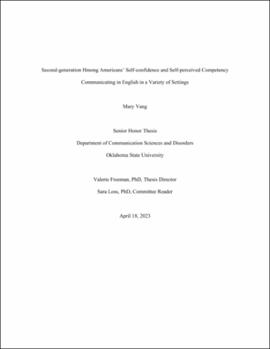| dc.contributor.author | Vang, Mary | |
| dc.date.accessioned | 2023-05-12T21:38:11Z | |
| dc.date.available | 2023-05-12T21:38:11Z | |
| dc.date.issued | 4/18/2023 | |
| dc.identifier | oksd_vang_secondgeneration_hmong_americans_selfconfidence_2023 | |
| dc.identifier.uri | https://hdl.handle.net/11244/337678 | |
| dc.description.abstract | After resettling to the United States in the late 1970s, Hmong refugees have integrated into American society by learning a second language, English. In recent years, many researchers have focused their studies on the declination of the Hmong language and the impact this decline has on the Hmong American community language (Thao 2020; Xiong-Lor, 2015; Yang Xiong, 2019). On the other hand, there has been less research on the acquisition of English among Hmong Americans and its broader impact on the Hmong community. This research project seeks to explore the experiences of second-generation Hmong Americans after learning English and whether being English language learners has affected their self-confidence and self-perceived competency in communicating in English. Data was collected using a mixed-method that consisted of a language background questionnaire and a 20-minute semi-structured Zoom interview. Questions for the interview portion included a mix of questions from the Bilingual Language Profile, the Language Experience and Proficiency Questionnaire (LEAP-Q), and the Quantifying Bilingual EXperience (Q-BEx) questionnaire. Data collected from 15 participants found that higher self-confidence and self-perceived competency reflected participants' willingness to communicate in different settings. Participants reported higher self-competency and confidence in English compared to lower self-competency and confidence in Hmong, and higher willingness to communicate in English in formal and informal settings compared to lower willingness to communicate in Hmong in formal and informal settings. Thematic analysis for the interviews also found that second-generation Hmong Americans have a positive outlook as the Hmong community shifts from being a Hmong-dominated speaking community to becoming a bilingual Hmong and English-dominated speaking community. | |
| dc.format | application/pdf | |
| dc.language | en_US | |
| dc.rights | Copyright is held by the author who has granted the Oklahoma State University Library the non-exclusive right to share this material in its institutional repository. Contact Digital Library Services at lib-dls@okstate.edu or 405-744-9161 for the permission policy on the use, reproduction or distribution of this material. | |
| dc.title | Second-generation Hmong Americans' self-confidence and self-perceived competency communicating in English in a variety of settings | |
| osu.filename | oksd_vang_secondgeneration_hmong_americans_selfconfidence_2023.pdf | |
| osu.accesstype | Open Access | |
| dc.type.genre | Honors Thesis | |
| dc.type.material | Text | |
| dc.contributor.director | Freeman, Valerie | |
| dc.contributor.facultyreader | Loss, Sara | |
| thesis.degree.discipline | Communication Sciences and Disorders | |
| thesis.degree.grantor | Oklahoma State University | |
